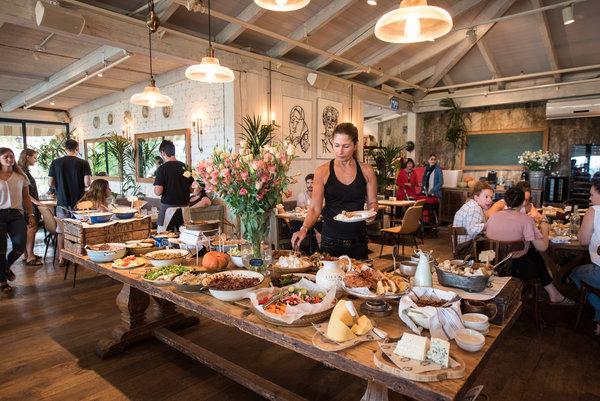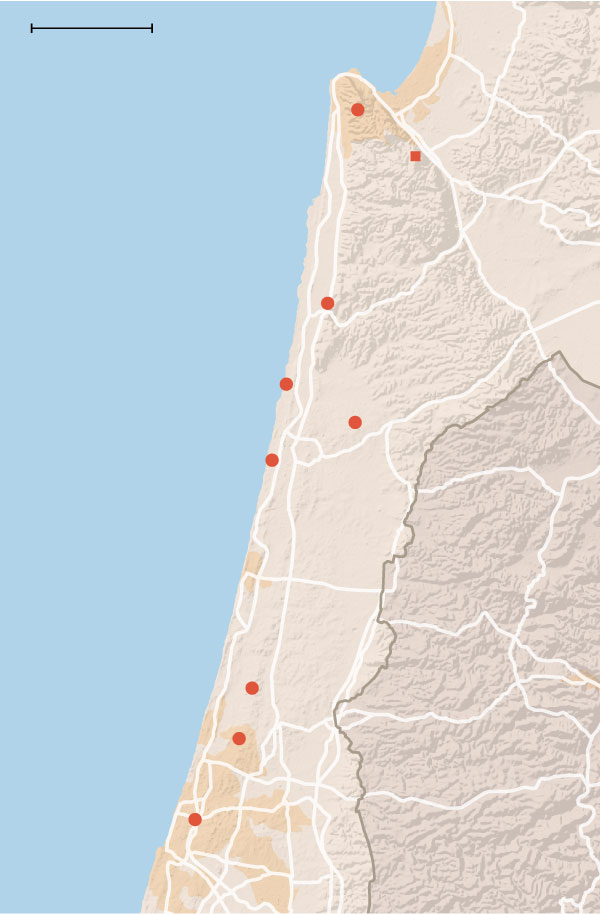The Israeli chef Snir Eng-Sela was leading the kitchen at Commerce, Harold Moore’s now-closed American nouveau restaurant in the West Village, when he realized he’d had enough.
He was living in a cramped one-bedroom in the West Village with his wife and their 4-year-old daughter Mya. Mr. Eng-Sela had spent years clawing his way up the restaurant-world ladder, graduating from the Culinary Institute of America before learning on his feet at Santi Santamaria’s Michelin-starred Can Fabes in Catalonia and the once stalwart Tribeca French institution Montrachet. From there, it was a sous chef slot at Dan Barber’s Blue Hill, and then a turn at Mr. Barber’s Blue Hill at Stone Barns. All of this had led him to Commerce, where bartenders were mixing $17 cocktails, avocado was served on spelt and flaxseed toast, and ingredients like pickled ramps and Parmesan foam crowded the menu.
He was craving simplicity and space. So in 2011, he and his family came back to the suburbs of Tel Aviv, moving into the house once owned by Mr. Eng-Sela’s grandfather.
But Tel Aviv had changed in the decades Mr. Eng-Sela was gone, and with its flashy new restaurants and sky-high rents, looked a lot like the New York that he had just fled.
“It was definitely not the same country that I had left,” he said. So when he was approached by the owners of Gouje and Danielle, a rustic bistro on Israel’s Sharon Plain, the fresh air alone was enough to make him say yes.
It’s been a decade or so since the Tel Aviv gastronomic scene came to global attention, catapulting local sons like Meir Adoni and Eyal Shani to success in Paris and New York. But amid the din and rising prices that comes with so much hype, Tel Aviv restaurateurs are now moving north in search of quieter pastures.
Like Mr. Eng-Sela, many have settled in the Sharon Plain, which stretches across the coastal lowlands between Haifa and Tel Aviv, south from Mount Carmel down to the banks of the Yarkon River. A string of new chef-run restaurants is transforming this once-sleepy patch into Israel’s newest culinary destination.

On Sundays, Gouje and Danielle puts out a farm-style buffet.CreditTzachi Ostrovsky for The New York Times
Brunch in the green, flowered hills
Gouje and Danielle, a big and charming restaurant with white brick walls and sweeping views of the Sharon’s valleys, is unfussy and bright. Situated a 45-minute drive from Tel Aviv on Moshav Bnei Tsion, a cooperative farm of green flowered hills, it offers a pared down menu featuring local ingredients with French and Italian influences.
Seasonal specialties, based on whatever produce is at peak freshness, are rotated alongside a set menu of classics including hand-rolled Calamarata, a thick, ring-shaped pasta, with white grouper; a trademark root vegetable salad with citrus dressing, and Venetian-style veal schnitzel. The restaurant also offers a farm-style brunch buffet, in which diners serve themselves from a long table heaped with roasted vegetables, local cheeses, freshly baked breads, smoked fish and more.
“I feel like the dining experience outside of Tel Aviv is better now,” says Mr. Eng-Sela. “The guests that come are more open-minded and more at ease. And for me, to be able to do genuinely good food without the cutthroat environment of New York or Tel Aviv, it means I can have a family and still work as a chef.”
Anshei Bereshit 39, Bnei Tsion; +972 9-771-4122
Elchnanan-Breads Bakery is an unassuming spot for platters packed with local eggs, vegetables and more, plus baked goods. CreditTzachi Ostrovsky for The New York Times
A temple of sourdough and yeast
He isn’t alone. Just outside the quiet town of Karkur, a former protégé of Alain Ducasse, the multiply Michelin-starred chef, has built a temple of sourdough and yeast on the grounds of a quiet kibbutz. Eldad Shmueli, the former executive chef of Tel Aviv hot spot Claro, always dreamed of having his own restaurant in the Israeli countryside, which he finally realized in 2016 when he opened Elchanan-Breads Bakery on Kibbutz Mishmarot.
It’s an unassuming spot — until you sidle up to the counter and view the wares on offer: knafe croissants — a Middle East remix of the Cronut, featuring phyllo dough and soft white cheese; chocolate babka with a glaze so thick you can see your reflection; and the breakfast-for-two platters packed with local eggs, fresh and roasted vegetables, cheeses and an entire loaf of bread.
“It’s not easy to make a high-end style restaurant outside of Tel Aviv, which is one of the reasons I chose to do a bakery,” Mr. Shmueli says. “Yes, I love baking, but also it’s still part of the dream, which is simply to make food.”
Elchanan has been a hit — 30 percent of its clientele, Mr. Shmueli says, are traveling foodies coming from Tel Aviv — so he plans to expand to dinner, featuring bruschetta, wood-fired pizzas and local wines, at the end of October.
Mishmarot, Pardes Hanna-Karkur; +972 4-883-8200
The menu at Thai Underground is limited, with just a handful of starters, including glass noodle salad.CreditTzachi Ostrovsky for The New York Times
Thai food in a former milking parlor
Yoav Zidon and his wife Sagit, who live just down the road in the heart of Karkur, have a similar story. The couple spent 10 years running a seafood restaurant and sailing club on the beach in Herzliya, an upscale coastal city that sits within the borders of greater Tel Aviv.
They were successful, which was a problem. What had started out as a tiny seafood stall on the beach, inspired by Mr. Zidon’s post-army travels in Thailand, morphed over the years into an enterprise of 50 workers. He decided to sell and head to the Sharon. Ms. Zidon, an artist and photographer, opened a small furniture and design studio, and by night, her own refurbished chairs and tables doubled as seating for Thai Machteret (Thai Underground), Mr. Zidon’s pint-size Thai street food spot.
Word spread quickly and diners would line up for an hour or more on Ms. Zidon’s hand-painted benches for a spot.
This summer, Mr. Zidon moved into a new space nearby, taking over the milking parlor of an abandoned agricultural school and converting it into a dining room that can seat 70. The move also granted him a quarter acre of land, which he is turning into a Thai vegetable and herb garden.
“And now it’s the second chapter of my life,” he said. “And I’m now doing what I want.” The menu at Thai Machteret is as streamlined as the space: a handful of spicy starters, including Yum Woon Sen (glass noodle salad) or Som Tam (spicy green papaya salad) to start, and just two mains, Pad Thai or Massaman Curry.
Hagana St. 1, Pardes Hanna-Karkur; +972 51-202-0590
Helena -Plancha charred purple calamariCreditTzachi Ostrovsky for The New York Times
Authenticity on the water
Among Thai Underground’s devotees is Amos Sion, the longtime chef and co-owner of Helena, an upscale seafood bistro so close to the waves in the seaside town of Caesarea, that seaspray hits the windows.
Mr. Sion has been a devotee of the Sharon for nearly two decades, foraging its hills for mushrooms, sourcing his vegetables and Leccino olive oil from nearby villages, and snatching up calamari, sea bream and gray mullet from the fishermen of Fureidis and Givat Olga (nearby Arab and Jewish towns) as it is pulled from the water. Everything he uses comes from within 10 kilometers of the restaurant.
“I have everything I need right around me, so of course it affects how I cook in my kitchen,” he says.
Mr. Sion’s menu includes plancha-charred purple calamari with za’atar leaves and labneh cheese; grouper cured with beetroot and the anise-flavored liqueur Arak; a shrimp bisque topped with hand-rolled tortellini, egg yolk and Jerusalem artichoke; and his often-imitated tahini ice cream, topped with date syrup.
“If you want to visit the best culinary sites of Israel, of course you must visit Tel Aviv. But there are now restaurants outside of Tel Aviv that are taking things seriously,” he said. “And it’s a different ambience, it’s more relaxed, it’s less pretentious. It’s just more authentic.”
Caesarea Port, Caesarea; +972-4-610-1018







